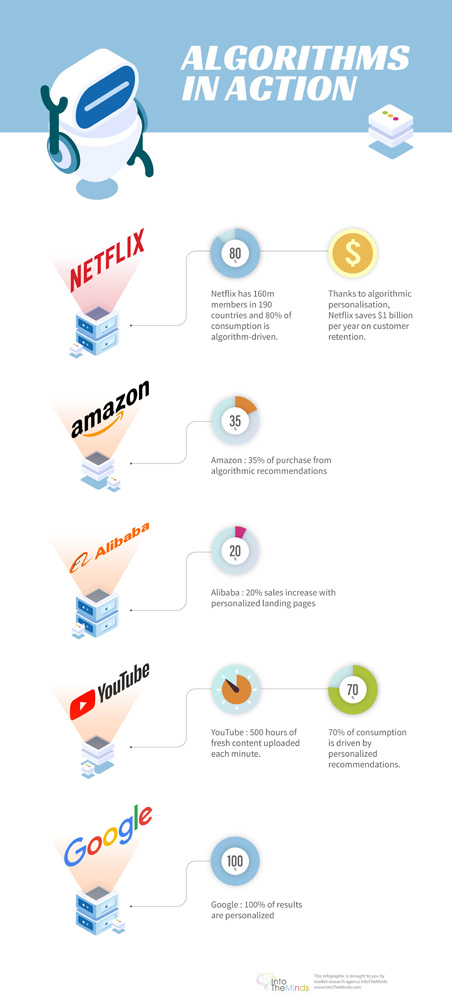For some businesses algorithms have become instrumental to their strategy as a whole and their marketing strategy in particular. These algorithms are a well-kept secret and businesses have emerged that sell their knowledge on the inner working of those algorithms.
PageRank and SEO agencies
Look at Google for instance. Their search engine (which is in fact a very sophisticated recommendation system) is constantly evolving, affecting millions of websites around the world. SEO agencies have specialized into optimizing their clients’ websites to be better ranked by Google’s algorithm.
Another example is Facebook, whose algorithm decides on the visibility of a post in users’ feeds. Specialized agencies try to find strategies to obtain more views or more engagement (crossposting is one such technique that leads to much experimenting since it was launched in 2016).
The Linkedin algorithm
At a lesser scale, this phenomenon also affects other platforms which make use of recommendation algorithms.
Linkedin for instance has undergone massive, yet discrete, changes since its takeover by Microsoft. Their algorithm determines the visibility of a post in your connections’ timelines. Experiments have shown that publishing updates containing images and hyperlinks led to less visibility. Linkedin consultants concluded that Linkedin’s algorithm was penalizing updates with those characteristics which led to the development of strategies to circumvent those problems.
Interview: Bruno Fridlansky’s advice to increase the virality of your LinkedIn posts.
What are the levers you need to play with to take advantage of the LinkedIn algorithm?
“Today, what measures commitment…is the feedback we receive on our publications and the author’s response to the feedback. So, is there a good hour to publish? No, there’s no more bullshit than those infographics that come out with hourly averages. If we have to respect them, that is to say; we have to publish on Tuesday, Thursday, between 10 and 11 am. It’s just averages, and averages mean nothing. I say that the right time to publish is when you know that you can be available within two hours to respond to comments because it is a tool for making conversations. If you want to communicate, it’s useless. You’re not going to make any connections. The purpose of this tool is to connect with humans and make professional relationships. So, you’re going to publish when you know you’re going to be able to respond to the people who are going to comment on you back there. What is a good publication? There, indeed, the format can play a role. What does that mean? LinkedIn will favour publications with text or text, with a PDF document or a native video, that is to say, a video that you will upload directly to LinkedIn. On the other hand, it will rather penalise publications with external links. It makes LinkedIn members leave, and that’s out of the question for the network. They want members to stay within LinkedIn. That’s on the format. Then what do you say if you’re talking about yourself? What I very vulgarly call Professional Wanking, interests no one, except your small ecosystems. But at that moment, we are among ourselves. No, what is needed is to bring value. What are you going to publish that will bring value to your interlocutor? How are you going to make them learn something? Make him or her progress? Make them think and then think together through the comments that will interact. Don’t tell me about you, tell me about me. That’s all that interests me. That’s how everybody reacts.”
The AirBnB algorithm
Another less known example is GuestReady, a French startup that helps AirBnB hosts better manage their property to maximize their financial return. Their business model is to take care of the property to make the owner’s life easier (maintenance of the property, handing the keys over, cleaning before the next guest arrives) but also to help the owner gets a better visibility on the platform. That’s the claim made by Bertrand Desis, GuestReady’s co-founder, in an interview to the French journal “La Tribune” where he explained that their knowledge of AirBnb’s algorithm allows them to boost a listing’s visibility on AirBnb’s website. The variables influencing a listing’s visibility on AirBnB, he explains, are :
- the frequency of price changes
- pictures
- response time
Conclusion
Algorithms have become a central piece of many companies’ strategies. For some those algorithms are even the central piece of technology that creates the very value of the company (what would Google be without its recommendation system?). Because those algorithms remain opaque, other businesses have developed around trying to understand how they work. It’s not reverse engineering (no one knows the code and is able to reverse engineer it). Rather it’s empirical knowledge building, trying to understand from an algorithm’s response what its inner working mechanisms look like.
Posted in Innovation.
